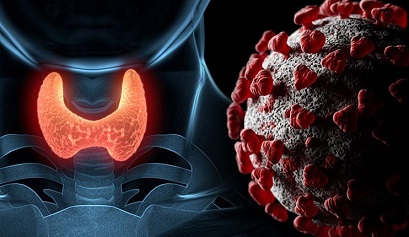COVID-19 News: Study Shows That SARS-CoV-2 Infections Causes Thyroxine Fluctuations.
COVID-19 News - SARS-CoV-2 - Thyroxine Mar 03, 2023 2 years, 1 month, 2 weeks, 1 day, 3 hours, 44 minutes ago
COVID-19 News: A new metanalysis study conducted by researchers from Xiamen University-China, Fujian Medical University-China and Peking Union Medical College-China has found that SARS-CoV-2 infections causes fluctuations in thyroxine fluctuations which can lead to health issues.

Past
COVID-19 News coverages had showed that SARS-CoV-2 affects the thyroid gland.
https://www.thailandmedical.news/news/long-covid-italian-researchers-warn-that-sars-cov-2-induced-thyroid-dysfunction-can-linger-on-for-more-than-a-year
https://www.thailandmedical.news/news/breaking-cso-from-london-medical-laboratory-warns-that-thyroid-issues-escalating-rapidly-in-the-united-kingdom-could-be-due-to-omicron-or-previous-var
https://www.thailandmedical.news/news/italian-study-presented-at-endocrine-society-s-2021-annual-meeting-shows-that-sars-cov-2-causes-a-unique-thyroid-inflammation-in-some-patients-
https://www.thailandmedical.news/news/covid-19-latest-yet-another-study-showing-effects-of-sar-cov-2-on-the-thyroid-gland-including-thyrotoxicosis
https://www.thailandmedical.news/news/breaking-covid-19-research-new-study-reveals-that-sars-cov-2-coronavirus-also-affects-thyroid-functions-in-majority-of-covid-19-patients
https://www.thailandmedical.news/news/warning-covid-19-patients-could-also-develop-thyroid-infections
It has already been known that viral infections may affect thyroid function through hormones and immunoregulatory signaling molecules.
To date however, changes in thyroid function in patients with COVID-19 have not been well described, and the particular mechanism is still controversial.
Certain mechanisms proposed are the SARS-CoV-2 virus’s direct or indirect invasion of the thyroid gland, effects of systemic inflammatory immune responses, and nonspecific adaptive mechanisms.
https://pubmed.ncbi.nlm.nih.gov/34380183/
07963/">https://pubmed.ncbi.nlm.nih.gov/32507963/
Past studies have examined whether thyroid diseases increase the risk of adverse outcomes in patients with COVID-19. Some studies concluded that thyroid diseases do not affect the progression of COVID-19, whereas some reported poor outcomes in patients with COVID-19 and thyroid diseases.
https://pubmed.ncbi.nlm.nih.gov/34386388/
https://pubmed.ncbi.nlm.nih.gov/33013686/
Numerous reviews have revealed conflicting results about the relationship between thyroid and COVID-19, arguing that thyroid diseases are unrelated to SARS-CoV-2 infection and deterioration.
https://pubmed.ncbi.nlm.nih.gov/33843008/
https://pubmed.ncbi.nlm.nih.gov/33765288/
https://pubmed.ncbi.nlm.nih.gov/32755846/
Any conclusions may be controversial due to the lack of large-scale clinical studies.
This new research however aimed to evaluate available evidences systematically, assess the level of thyroid function in patients with COVID-19 through meta-analysis, and analytically compare differences in thyroid function among different populations during the epidemic and assess thyroxine levels in COVID-19 patients, compared with non-COVID-19 pneumonia and healthy cohorts.
A search detailed was performed in English and Chinese databases from inception to August 1, 2022. The literature search strategy was based on the following keywords: ([T3 OR FT3 OR triiodothyronine] or [T4 OR FT4 OR thyroxine] or [TSH or thyrotropin]) and (COVID-19 OR SARS-CoV-2 OR 2019 novel coronavirus).
The main primary analysis assessed thyroid function in COVID-19 patients, comparing non-COVID-19 pneumonia and healthy cohorts. Secondary outcomes included different severity and prognoses of COVID-19 patients.
In all, a total of 5873 patients were enrolled in the study.
The pooled estimates of TSH and FT3 were significantly lower in patients with COVID-19 and non-COVID-19 pneumonia than in the healthy cohort (P < 0.001), whereas FT4 were significantly higher (P < 0.001). Patients with the non-severe COVID-19 showed significant higher in TSH levels than the severe (I2 = 89.9%, P = 0.002) and FT3 (I2 = 91.9%, P < 0.001). Standard mean differences (SMD) of TSH, FT3, and FT4 levels of survivors and non-survivors were 0.29 (P= 0.006), 1.11 (P < 0.001), and 0.22 (P < 0.001). For ICU patients, the survivors had significantly higher FT4 (SMD=0.47, P=0.003) and FT3 (SMD=0.51, P=0.001) than non-survivors.
The study findings showed that compared with the healthy cohort, COVID-19 patients showed decreased TSH and FT3 and increased FT4, similar to non-COVID-19 pneumonia. Thyroid function changes were related to the severity of COVID-19. Thyroxine levels have clinical significance for prognosis evaluation, especially FT3.
The study findings were published in the peer reviewed journal: Frontiers In Endocrinology.
https://www.frontiersin.org/articles/10.3389/fendo.2023.1089190/full
The study findings showed that Thyroxine levels (TSH, FT3, and FT4) fluctuated in patients with COVID-19.
Importantly, compared with the healthy cohort, patients with COVID-19 showed decreased TSH and FT3 levels and increased FT4 levels.
Interestingly, there were differences in thyroxine levels between severe and non-severe patients. No significant difference in TSH levels between severe and non-severe patients according to the WHO classification criteria, whereas FT4 levels were not significantly different in the studies using non-WHO classification criteria.
However, FT3 levels were significantly lower in severe patients than in non-severe patients in the included study.
Furthermore, different thyroid function parameters were assessed differently with regard to patient outcomes.
TSH and FT4 levels have limitations in the prognostic evaluation of ICU patients and are ineffective in assessing patient outcomes. In general wards, TSH and FT4 are still effective, but the clinical application value is limited due to slight differences. FT3 levels can be adapted as an outcome assessment indicator for patients in ICU or not, with a reliable scope of application.
For the latest
COVID-19 News, keep on logging to Thailand Medical News.
Read Also:
https://www.thailandmedical.news/news/breaking-covid-19-endocrine-system-new-study-shows-that-sars-cov-2-damages-the-endocrine-system
https://www.thailandmedical.news/news/covid-19-news-italian-study-shows-sars-cov-2-causes-transcriptional-alterations-of-endocrine-specific-genes-leading-to-a-variety-of-endocrine-issues
https://www.thailandmedical.news/news/first-documented-long-covid-case-study-involving-impaired-secretion-of-adrenocorticotropic-hormone-due-to-sars-cov-2-infection
https://www.thailandmedical.news/news/breaking-news-italian-study-reveals-that-sars-cov-2-is-able-to-affect-the-pituitary-gland-leading-to-possible-hypopituitarism-and-a-variety-of-disorde
https://www.thailandmedical.news/news/coronavirus-news-cedars-sinai-medical-center-study-confirms-that-the-sars-cov-2-virus-infects-the-pancreas-directly
